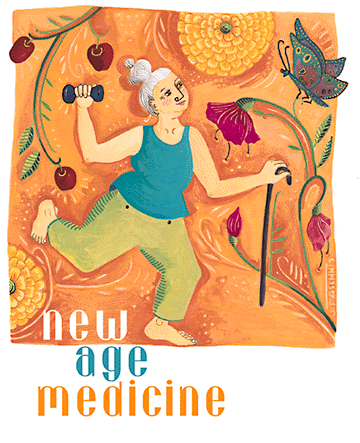

They Swim; They Walk; They Even Pump Iron. Elderly Americans Find a New Lease on Life Thanks to UW Research Center.
by Julie Rathbun
Nellie Frye needed groceries. So she called her friend Mildred, and the two set off, on foot, to the supermarket.
"The last time I walked up that hill I swore I'd never do it again--it nearly killed me," claimed Nellie, age 94, a slight smile working the weathered corners of her mouth. "But this time we made it back all right."
Months earlier, Nellie's major activity was sitting in her easy chair. "It wasn't good. My daughter kept telling me to get out and my doctor gave me exercises but I didn't do them," she admits.
Her motivation to get moving came unexpectedly--the offering of a free exercise program for senior women living in her low-income housing building. Led by Marie Elaine Cress, UW exercise physiologist, the program is a research study designed to help seniors gain energy, motivation, strength and endurance through daily exercise.
Curiosity outweighing her skepticism, Nellie enlisted. And for the past month her week's activities have included walks and classes in strength training and flexibility.
Today, clad in a pink sweat suit, cuff-like weights hanging from her ankles, Nellie joins her fellow neighbors/fitness partners in the community room for strengthening exercises.
"It's time for your hip flexors," calls Cress brightly, exchanging smiles with the half-dozen women as she raises her leg up and down. "These are the ones that help you make it up the stairs."
With slow determination, the rest of the group follows Cress' lead--steadying their balance by clutching onto school chairs and exchanging encouragement, giggles and grunts. Like Nellie, other participants have been pleasantly surprised with the program, noting they "don't wobble as much," "have more energy" and "feel like a new person."
This newfound zest for life is spreading. Thousands of Seattle-area residents are reaping benefits from research projects and partnerships with senior centers, housing authority buildings and health-care management. At the center of this movement is the University of Washington Northwest Prevention Effectiveness Center, a collaborative center guided by the mission of "keeping older adults healthy and independent."
"Throughout the years our primary goal has remained the same: preventing dependence and institutionalization," stresses Ed Wagner, director of the prevention research center and the Center for Health Studies at Group Health Cooperative in Seattle. "These are the things seniors fear more than death."
Harnessing the Power of Prevention
Reaching Out to Seniors Where They Live
Partners in Prevention
Staying Active: 11 Tips for the Elderly
Send a letter to the editor at columns@u.washington.edu.